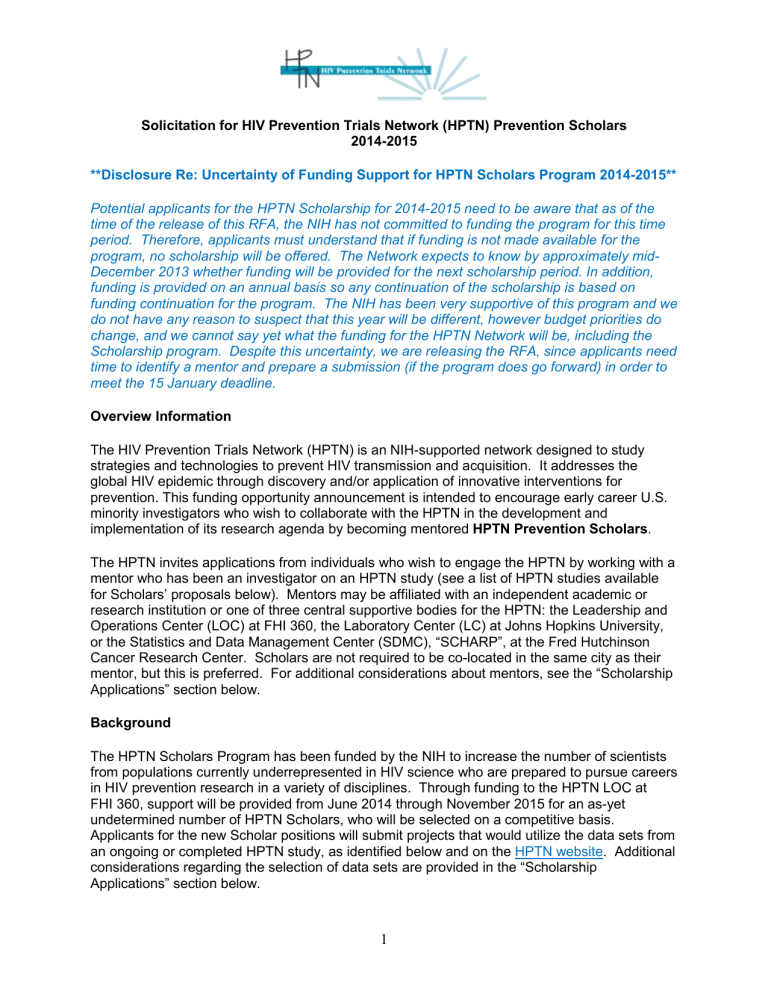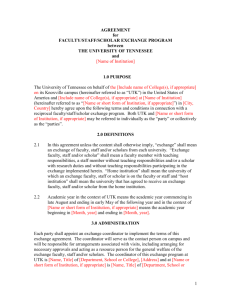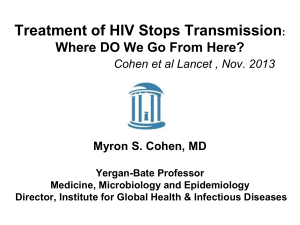Solicitation from the HPTN for Mentored Minority Researchers:

Solicitation for HIV Prevention Trials Network (HPTN) Prevention Scholars
2014-2015
**Disclosure Re: Uncertainty of Funding Support for HPTN Scholars Program 2014-2015**
Potential applicants for the HPTN Scholarship for 2014-2015 need to be aware that as of the time of the release of this RFA, the NIH has not committed to funding the program for this time period. Therefore, applicants must understand that if funding is not made available for the program, no scholarship will be offered. The Network expects to know by approximately mid-
December 2013 whether funding will be provided for the next scholarship period. In addition, funding is provided on an annual basis so any continuation of the scholarship is based on funding continuation for the program. The NIH has been very supportive of this program and we do not have any reason to suspect that this year will be different, however budget priorities do change, and we cannot say yet what the funding for the HPTN Network will be, including the
Scholarship program. Despite this uncertainty, we are releasing the RFA, since applicants need time to identify a mentor and prepare a submission (if the program does go forward) in order to meet the 15 January deadline.
Overview Information
The HIV Prevention Trials Network (HPTN) is an NIH-supported network designed to study strategies and technologies to prevent HIV transmission and acquisition. It addresses the global HIV epidemic through discovery and/or application of innovative interventions for prevention. This funding opportunity announcement is intended to encourage early career U.S. minority investigators who wish to collaborate with the HPTN in the development and implementation of its research agenda by becoming mentored HPTN Prevention Scholars .
The HPTN invites applications from individuals who wish to engage the HPTN by working with a mentor who has been an investigator on an HPTN study (see a list of HPTN studies available for Scholars ’ proposals below). Mentors may be affiliated with an independent academic or research institution or one of three central supportive bodies for the HPTN: the Leadership and
Operations Center (LOC) at FHI 360, the Laboratory Center (LC) at Johns Hopkins University, or the Statistics and Data Management Center (SDMC) , “SCHARP”, at the Fred Hutchinson
Cancer Research Center. Scholars are not required to be co-located in the same city as their mentor, but this is preferred. For additional considerations about mentors, see the “Scholarship
Applications” section below.
Background
The HPTN Scholars Program has been funded by the NIH to increase the number of scientists from populations currently underrepresented in HIV science who are prepared to pursue careers in HIV prevention research in a variety of disciplines. Through funding to the HPTN LOC at
FHI 360, support will be provided from June 2014 through November 2015 for an as-yet undetermined number of HPTN Scholars, who will be selected on a competitive basis.
Applicants for the new Scholar positions will submit projects that would utilize the data sets from an ongoing or completed HPTN study, as identified below and on the HPTN website . Additional considerations regarding the selection of data sets are provided in the “Scholarship
Applications” section below.
1
Scholarship Criteria
HPTN Scholars should:
Be citizens of permanent U.S. residents who are members of underrepresented racial/ethnic minority communities. Persons from such communities who are also of minority sexual orientation and/or gender identity are particularly encouraged to apply. The NIH does not predefine racial/ethnic minority communities, but rather gives this guidance:
“Individuals from racial and ethnic groups that have been shown by the National Science
Foundation to be underrepresented in health-related sciences on a national basis (see http://www.nsf.gov/statistics/wmpd/). In addition, it is recognized that underrepresentation can vary from setting to setting and individuals from racial or ethnic groups that can be convincingly demonstrated to be underrepresented by the grantee institution are eligible for support under this program .”
Have experience and/or substantial potential in conducting research with populations at risk in the U.S.
Have technical background suitable to become involved in a substantial component of the
HPTN science agenda, including ethical and community participation.
Demonstrate plans to work with and be mentored by an investigator actively involved in
HPTN research, based at an independent institution or at the Central Resources of the
HPTN.
Have the support of their host academic institutions that would allow them the time to participate in the mentored research program, traveling as required to work with their mentor and to key HPTN meetings.
While applicants from any racial/ethnic minority are eligible for the mentorship program, researchers who are individuals of color (e.g., Black and Latino/a) and with interest in specific issues related to sexual minorities are encouraged to participate and are the target of the initiative. We seek persons with special insight and potential to address research in the highest risk minority subpopulations in the U.S. The HPTN Scholarship will give priority to for investigators who are within 10 years of completing their terminal research degree, first postdoctoral fellowship, or first medical residency at the time of application and have not previously competed successfully as PD/PI for a substantial NIH independent research award (e.g. R01 grant).
Scholarship Program Goals
The Goals of the Scholars program are:
1. Through completing the scholarship requirements and by working with their mentor(s), the
HPTN Scholars will acquire new knowledge, skills and abilities to further their careers as independent investigators in HIV science;
2. The Scholars develop a research project, to be approved through the HPTN ancillary study processes, that will make use of data the Scholars will identify from completed or ongoing
HPTN studies. Further, that the Scholars, working with their mentors and other HPTN resources, will have completed their approved project and will present findings from their projects at the HPTN annual meeting 12 months into the program (and preferably at one or more other scientific meetings) and submit a manuscript from the project to a peer-reviewed journal by the end of the 18 month program period (typically with the scholar as the lead author).
2
3. Through the experience of the program, the Scholars become knowledgeable of the processes of doing research in NIH-funded HIV networks, and thereby have the opportunity to continue their careers in the HPTN after conclusion of the scholarship as members of a protocol team or through proposing new science funded by the HPTN.
The HPTN Prevention Scholars program is designed to provide partial salary support to complement other support that the investigators receive from their home institution.
Scholarship Program Offerings
The HPTN Prevention Scholars program will offer the following:
1. An orientation to be held with the selected Scholars before project initiation, in conjunction with the HPTN Annual Meeting.
2. In-residence experience at the mentor’s institution, during which the scholars will be encouraged, to the degree possible, to participate in study design, conduct, analysis, writing, and community engagement.
3. Regular meetings, in person, with the primary mentor on site - if the mentor and mentee are co-located in the same city - or by conference call if not co-located.
4. Travel to the partnering mentor’s location for an 8-16 week period (or several times per year), in situations where the mentor and mentee are not located in the same city.
5. Travel to two HPTN annual meetings during the program period, and to one national or international scientific meeting (note that international travel is approvable only if affordable and if a Scholar is presenting HPTN work).
6. Participation in a series of group activities designed for further career development of the
Scholars, including monthly conference calls of the group to discuss ongoing research projects, new funding sources for career development, and opportunities for wider collaboration as well as additional training activities coordinated by relevant NIH bodies.
7. Travel to and participation in a mid-program networking and skills-building meeting coordinated by the program.
8. Proposed 10% to 30% scholar salary support.
Identification of Projects and Mentors
Applicants must propose a project using a dataset from an ongoing or completed HPTN Study, as identified below and on the Scholars' page of the HPTN website. Applicants are encouraged to refer to the list on the website for the most current information. Applicants should take into consideration that working with data from ongoing studies may provide rich opportunities for interaction with participants and study staff (if the study is domestically based), and learning about the challenges of study implementation. However, access to data from ongoing studies may be delayed and publication of S cholars’ papers may need to be postponed until the study’s primary paper has been published. Scholars cannot propose to work on an ongoing study if there is doubt about whether the needed data will be available by the time the Scholar’s project is approved.
3
Scholars working from data sets of already-completed studies will have prompt access to complete datasets, but may miss experiences that working on an ongoing study can provide, as noted above.
HPTN studies that are still in the developmental stages or early implementation stages will not be made available to Scholars, since such studies may not gain funding or provide timely data.
Each Scholar must work with an HPTN mentor to participate in the program. The mentor must be an investigator who is/was a investigator on the HPTN study that the Scholar’s proposed project will be based upon. The initial task of a prospective applicant therefore is to identify both a dataset (study) that will allow her to develop a project that she is interested in, and a mentor from that study who is willing to work with the Scholar. A table of HPTN studies from which
Scholars are encouraged to generate proposals is provided below, including a list of investigators from those studies who have indicated that they may be willing to serve as mentors. Links from the table provide access (if available) to the data collection instruments that applicants can use to begin formulating a research question.
Scholarship applicants will need to identify their own HPTN mentors, either through their professional networks or by contacting one of the prospective mentors listed below. To prevent mentors from receiving last-minute requests from applicants, the deadline for contacting prospective mentors is 13 December 2013 . Applicants should put thought into potential research topics prior to contacting a prospective mentor and should remember that it is not the role of a mentor to come up with a research topic for the applicant. It is the decision of potential mentors whom to support or whether to support any Scholars.
Co-Mentoring
Persons who already have a mentor outside of the HPTN (or who have an HPTN mentor not affiliated with the study upon which the proposed project will be based) are also encouraged to apply for the program. In such cases, the Scholar will need to identify a co-mentor from the relevant study. The co-mentorship arrangement will be evaluated as part of consideration of the applicant for the HPTN Scholars program.
4
HPTN Studies and Mentors Available for Scholarship Projects
Study Potential Mentors Domestic/
International
Population Notes/Status
HPTN
033
HPTN
035
HPTN
037
HPTN
058
HPTN
059
HPTN
062
Dr. Dave Metzger
Dr. Sten Vermund
Dr. David Celentano,
Dr. Carl Latkin
Dr. David Celentano,
Dr. Carl Latkin,
Dr. Greg Lucas,
Dr. Dave Metzger
Dr. Sten Vermund
Dr. Amy Corneli
(as Co-Mentor)
International IDUs/PWID
Domestic &
International
HIV
Uninfected
Women
IDUs/PWID Domestic &
International
International IDUs/PWID
Domestic &
International
HIV
Uninfected
Women
International Acutely HIV infected
Concluded
Note: the value of this dataset may be limited to use in combination with the 058 dataset
Concluded
Concluded
Closed to Follow Up
Concluded
Participants Off Study &
Primary Analysis
Complete; 1 qualitative paper idea available
Closed to Follow Up HPTN
063
HPTN
068
Dr. David Celentano,
Dr. Matthew
Mimiaga,
Dr. Steve Safren,
Dr. Susan Sherman
Dr. Audrey Pettifor
International HIV-infected
International Adolescent
Girls
Note: Details about studies and study tools can be found at: www.hptn.org/hptn_structure/ScholarsDetails.htm
Closed to Accrual
Scholarship Applications
Applications (single spaced, 11 font Arial type) must be completed in full and include:
1. All contact and demographic information, including birth month/day/year, self-identified gender, and ethnic/racial self-identification;
2. Education and employment history, unless covered in NIH biosketch;
5
3. A letter of support from a US-based HPTN investigator offering to provide the scholar their mentorship;
4. A letter of support from the researcher’s immediate supervisor, clarifying that the time will be made free to engage fully the opportunities of the HPTN Scholar program;
5. One additional professional letter of support;
6. A maximum 1000 word statement of intent describing how the mentored experience would nurture the research career of the applicant, including the intended in-residence commitment, if planned, at the research site;
7. A project proposal, not to exceed 600 words, describing the research the scholar wishes to accomplish in 2014-2015. In submission, please include a copy of the project proposal in
MS Word format, so that text can be inserted as the scope of work in the subagreement, if awarded. The entire submission should be submitted in .pdf format with this exception.
8. A PHS 398 proposal to include the following forms: signed face page, detailed budget (form page 4), budget justification, biosketch form, other support, and checklist form with a copy of your institutional Negotiated Indirect Cost Recovery Agreement (NICRA). A template form set will be available from Ms. Hamilton to facilitate completion.
Note: If selected as a scholar, a copy of your institution’s recent audit report will be required for a pre-award review. Scholars will also need to determine if IRB approvals at their institution will delay the execution of a subagreement.
Note: Scholars must be able to receive NIH funds from the HPTN through a supporting institution via an agreement with FHI 360. This institution must submit the PHS package as the receipt of funds. This arrangement must be worked out in advance of submission of the application and is a requirement for acceptance as a Scholar. Scholars must consider not only the institution that will support them, but must also determine whether other awards from which they receive support will allow the Scholar to receive additional NIH funds. It is the Scholar’s responsibility to make these determinations and arrangements.
9. A budget similar in format to the example provided in Appendix 1, but customized for the applicant’s specific situation, encompassing:
Salary support of 10% to 30% of the 2014-2015 annual salary
Fringe benefits as per the S cholar’s institution of origin
Travel to the mentor’s location (local or out-of-town, depending on the location of the site and the home of the Scholar) and to two HPTN meetings
Travel to mid-year networking and skills-building training
Travel to one other professional meeting
Scholar-related expenses up to $2,250/year that may include books, software, communication, photocopying, and/or a computer or related hardware.
Including indirect costs, the total costs per Scholar will not exceed $95,000 per eighteen months.
10. The deadline for submission is 15 January 2014, 5PM EST, via email to Ms. Erica Hamilton at ehamilton@fhi360.org. Incomplete, non-responsive, or late submissions will not be considered. Selected 2014-2015 HPTN Scholars will be informed by early March 2014.
6
HPTN Scholarship Leadership may reopen the application process if no suitable applications are identified through the original submission process.
Review Criteria and Selection Process
Applicants will be evaluated by a team assembled by the Scholarship Leadership according to the review criteria below.
Potential for the candidate to contribute to the scientific objectives of the HPTN prevention agenda;
Quality of the project proposed by the scholar;
Appropriate personal and professional background to meet the objectives of the mentored research training objectives;
Commitment of the candidate, host HPTN investigator, and home supervisor;
Appropriate budget package that follows the guidelines of the instructions above and adequately supports the proposed scoped of work.
The HPTN Prevention Scholars Program is an 18-month commitment, pending availability of funds. Program participants are encouraged to use their time as Scholars to become integrated into the network in other ways, for example, as co-investigators on new studies, as members of scientific committees, or as manuscript collaborators, so that they may continue their career with the network even after the conclusion of their participation in the program.
Contacts: We encourage your inquiries concerning this funding opportunity and welcome the opportunity to answer questions from potential applicants.
Principal Contacts
Erica Hamilton, MPH, ehamilton@fhi360.org, (919) 544-7040 x 11295
Sam Griffith, MAT, sgriffith@fhi360.org, (919) 544-7040 x 11571
Additional Contacts
Darrell Wheeler, PhD, MPH, dwheeler@luc.edu, (312) 915-7024
Sten H. Vermund, MD, PhD, sten.vermund@vanderbilt.edu, (615) 322-9014
Applications must be received by 15 January, 2014 to Ms. Hamilton via email. All application attachments should be provided in
Adobe Acrobat™ .pdf format, with a copy of the project proposal also provided as a separate MS Word™ .doc file
7








